Doenjang, also referred to in English as thick sauce, is a traditional Korean fermented soybean paste and a staple ingredient in many Korean dishes. However, it may not be available in some parts of the world, and it might not be everyone’s cup of tea.
Doenjang has a pungent, salty, and slightly sweet flavor that adds depth and complexity to dishes. The paste's texture and taste are similar to several other Asian sauce substitutes, as the unique mix of umami and salty is quite popular in various forms.
But if you can't find fermented soybean paste, or if you have a soy allergy, there are plenty of doenjang alternatives that you can use. This article covers several doenjang substitutes that can offer a similar flavor and texture to the sauce in your dishes.
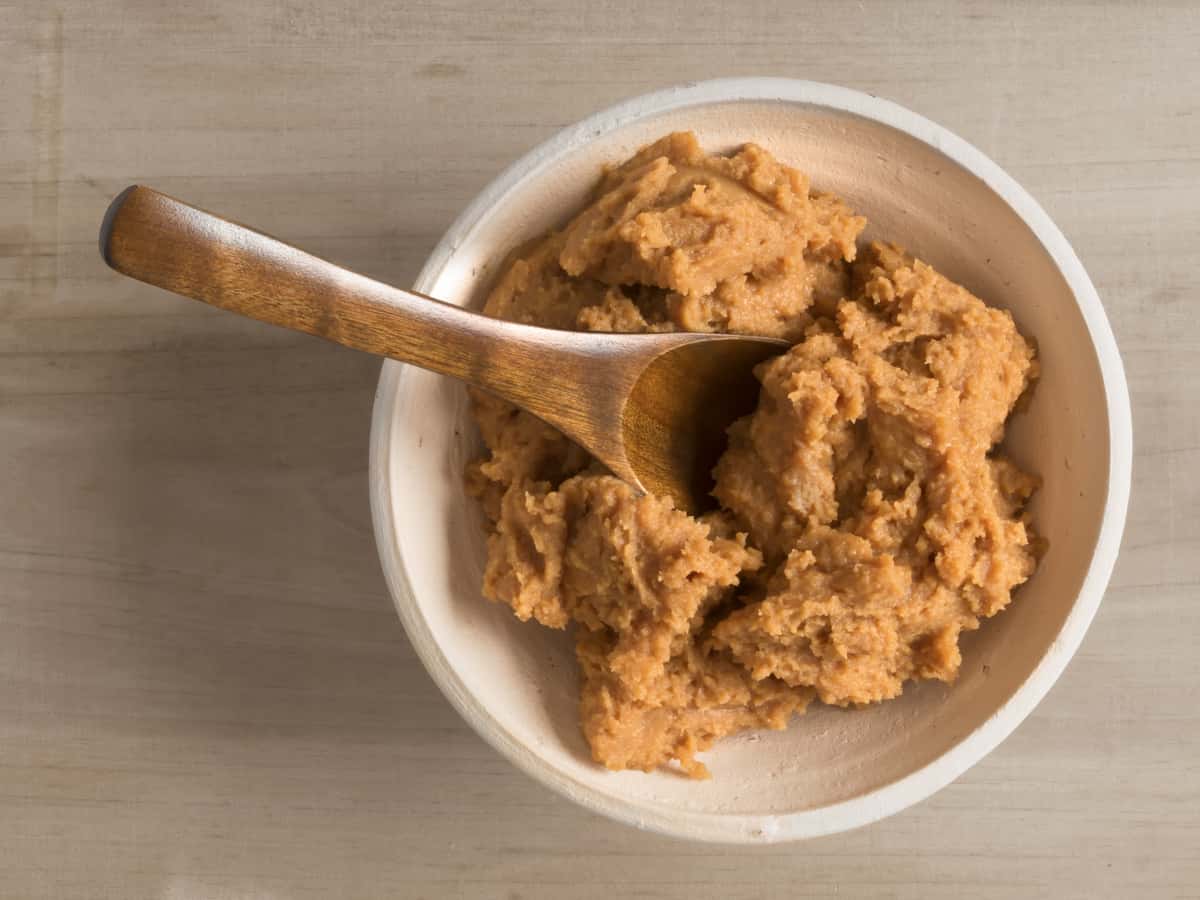
Jump To
What is Doenjang?
Doenjang is a type of fermented soybean paste that is commonly used in Korean cuisine such as soups, stews, and sauces. The paste is made by mixing boiled soybeans with salt and a starter called meju, which is a brick of dried fermented soybeans.
The paste is then left to ferment for several months to develop its distinctive flavor. It’s a key ingredient in many traditional Korean dishes, such as doenjang jjigae, which is a soybean paste stew, and bibimbap, a mixed rice bowl that's become pretty popular worldwide.
Doenjang comes in different varieties, ranging from light to dark brown, with taste and color depending on the length of fermentation and the type of soybeans used. Some types of doenjang may also contain other ingredients, such as chili powder, garlic, or sesame seeds to enhance the flavor.
Doenjang is also a nutritious ingredient that’s rich in protein, fiber, and vitamins. It’s also a good source of beneficial bacteria, which can aid digestion and boost the immune system. With so many great uses, health benefits, and taste in general, it would be hard to find a replacement for doenjang even if you wanted to.
But many factors come into play, so it’s always best to be prepared. Below are my picks for doenjang substitutes, based on years of living in Korea & cooking Korean dishes at home.
Best Doenjang Alternatives
Miso Paste
Made from fermented soybeans, miso paste has a similar umami flavor to doenjang and is a staple ingredient in Japanese cuisine. However, this doesn’t mean it can’t be used in Korean dishes, as it’s considered one of the best substitutes for doenjang.
Miso paste has a milder and sweeter flavor, so you may need to adjust the amount you use in your recipe to get the desired taste. This paste also has a smoother texture than doenjang, meaning it may not work well in recipes that require a thicker consistency.
There are different types of miso paste available, each with its unique flavor profile. White miso paste is milder and sweeter, while red miso paste is stronger and saltier. The type of paste you choose should depend on the type of dish you’re making, so choose carefully if you want to substitute doenjang with miso paste.
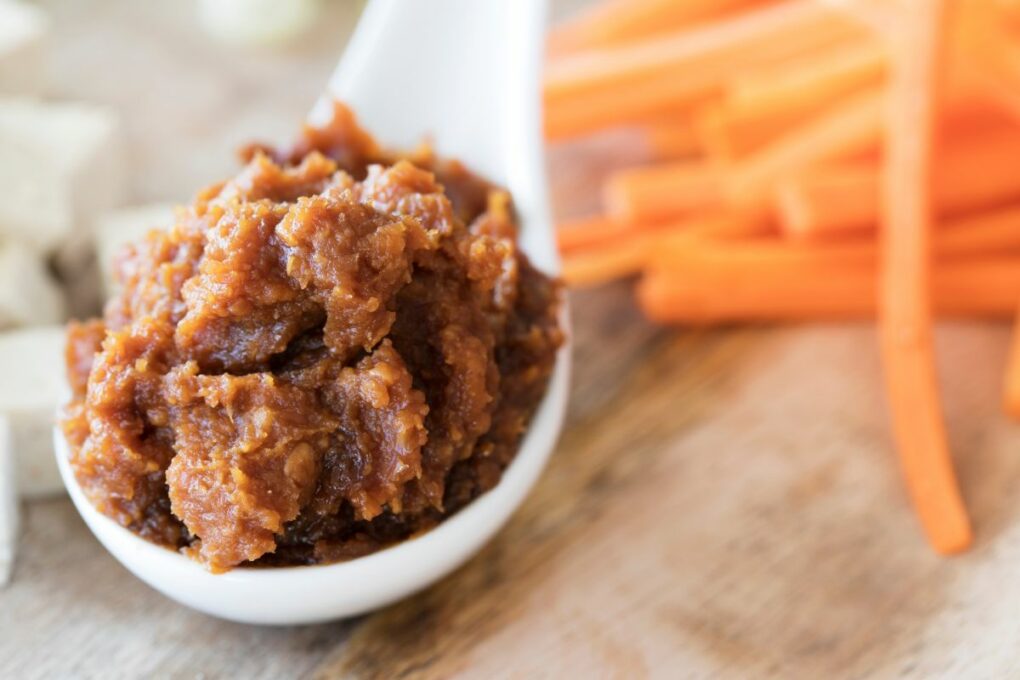
Ssamjang
Ssamjang is a traditional Korean condiment that can also be a great substitute for doenjang. While doenjang is a fermented soybean paste that’s commonly used in Korean cooking, ssamjang is a mixture of doenjang and other ingredients such as gochujang (a spicy red pepper paste), garlic, sesame oil, and sugar.
One of the benefits of using ssamjang as a substitute for doenjang is that it has a more complex flavor profile. The addition of gochujang and other ingredients gives ssamjang a spicy and sweet flavor that can enhance the taste of many dishes, all the while retaining a splash of doenjang in the process.
Gochujang
If you're looking for a doenjang substitute that is not as pungent but still holds a lot of its qualities, gochujang is a superb option. Gochujang is a Korean red pepper paste that’s made from fermented soybeans, chili peppers, and glutinous rice.
The paste has a sweet, spicy, and savory taste and a thick consistency. You can use gochujang as a doenjang substitute in soups, stews, marinades, and sauces, as it adds a depth of flavor and a hint of heat to your dishes, but buy level 1 spicy if you don't want to also add a big kick to the dish.
Keep in mind that even level 1 spicy gochujang is spicier than doenjang, so you may need to adjust the amount you use based on your flavor preferences.
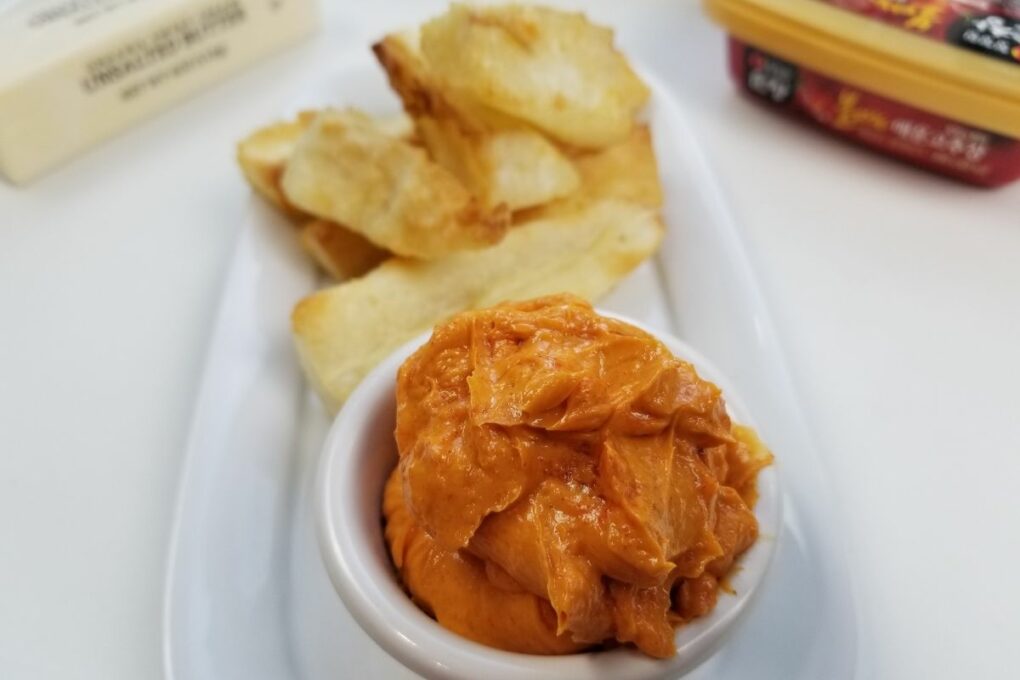
Doubanjiang
Fermented broad beans, chili peppers, soybeans, and salt are combined to create the hot and salty paste known as doubanjiang. It’s a staple ingredient in Sichuan cuisine and is widely used to add flavor and heat to a variety of dishes, including stir-fries, stews, and soups.
Using doubanjiang simply requires adding equal amounts to the recipe. However, it’s spicier than doenjang or level 1 gochujang, so adjusting or removing the other spicy ingredients helps to balance out your recipe and achieve desired heat level.
Korean Soy Sauce
A well-known ingredient in Korean cuisine that’s often overlooked as a substitute for doenjang. While doenjang has a unique flavor and aroma that can’t be replicated by soy sauce, there are certain situations where Korean soy sauce can be used as a substitute.
One of the main advantages of using Korean soy sauce as an alternative to doenjang is its availability. Soy sauce is available in nearly all grocery stores and supermarkets, while doenjang may be harder to find in some areas. Also, soy sauce is less expensive than doenjang, making it a more budget-friendly option in pinch.
Korean soy sauce is made from fermented soybeans and has a salty and savory taste, with it being darker and thicker than regular soy sauce and having a more complex flavor profile. It's also less sweet than Japanese soy sauce, which makes it a great option for savory dishes.
Soy sauce has a salty and savory flavor, whereas doenjang has a more complex and earthy flavor. To replicate the flavor of doenjang as closely as possible, it’s recommended to use a dark soy sauce that has been aged for a longer period.
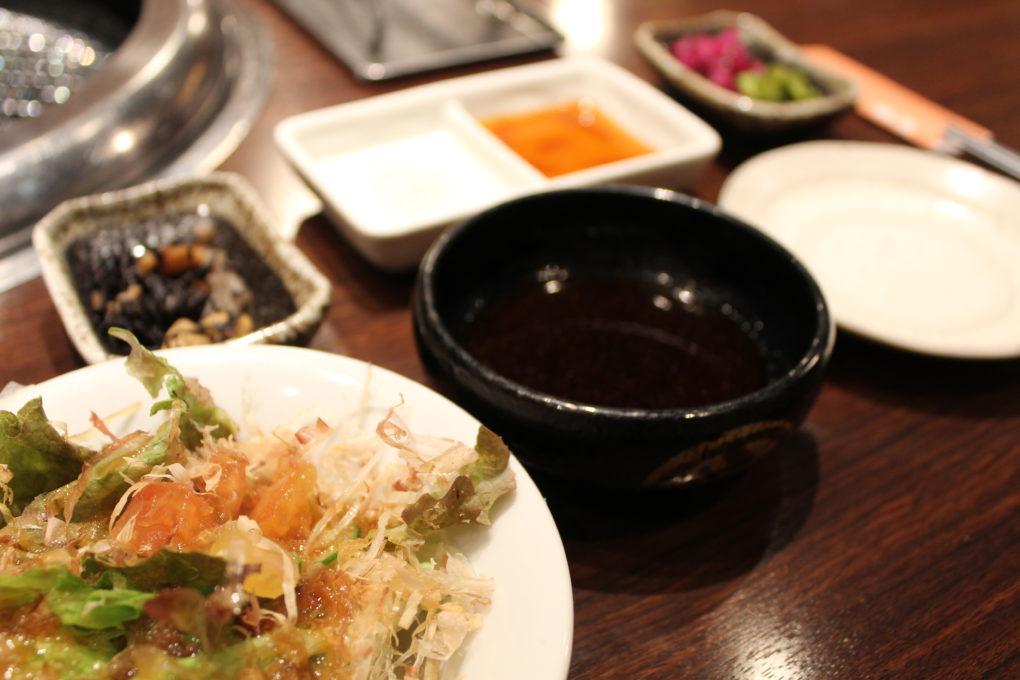
Hoisin Sauce
If you are looking for a doenjang substitute with a sweet and savory flavor profile, hoisin sauce is just the sauce you need. Hoisin sauce is made from soybeans, sugar, vinegar, garlic, and chili peppers, giving it a similar flavor to doenjang. However, it’s sweeter and less salty, so you’ll have to work it into your recipe properly.
Hoisin sauce is a versatile ingredient that can be used in a variety of dishes, including stir-fries, marinades, and dipping sauces. More commonly used in dishes enjoyed in China and throughout Vietnam, it can also be used in Korean dishes as a doenjang substitute.
Keep in mind that it has a thicker consistency than doenjang so diluting it with water, stock, or other liquids will help you to reach the desired consistency with your recipe.
Also, hoisin sauce contains sugar, meaning it can burn easily if cooked at high temperatures, so be sure to watch your heat and stir frequently to prevent burning.
Sweet Bean Sauce
Sweet bean sauce is also a highly used ingredient in Chinese cuisine that’s made from fermented soybeans and sweetened with sugar. While it may not be an exact substitute for doenjang, it can be used as a flavorful alternative in certain dishes.
Sweet bean sauce is commonly used in Chinese cuisine, particularly in dishes like peking duck and moo shu pork. It's also a popular ingredient in Korean cooking, where it's known as chunjang.
The sweet bean sauce, as the name suggests, has a sweeter taste than doenjang so you may need to adjust the amount of sugar or other sweeteners in your recipe to balance out the flavor. Additionally, sweet bean sauce is generally thicker than doenjang, so thinning it out with some water or broth is your best bet.
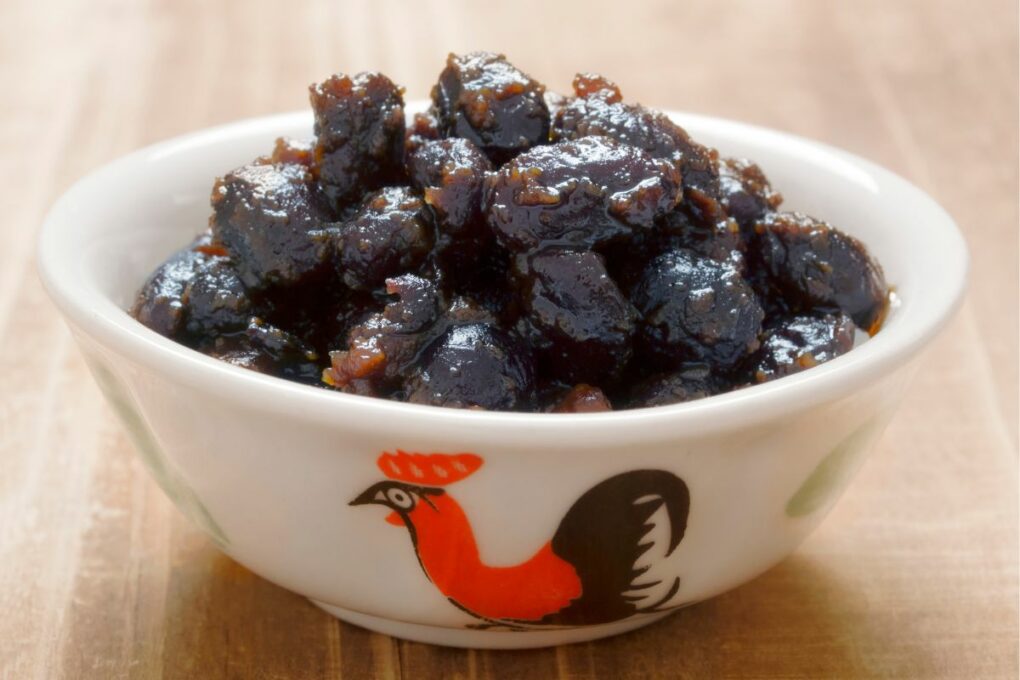
Fermented Black Beans
Fermented black beans are a sought-after ingredient in many Chinese dishes. They are made by fermenting soybeans with salt and other seasonings, resulting in a savory and salty flavor with a hint of sweetness. These beans are often used in stir-fries, soups, and sauces to add depth and complexity to the dish.
If you’re going to use fermented black beans as a substitute for doenjang, start by soaking them in water for about 10 minutes to remove any excess salt. Then, mash them into a paste and use them in place of the doenjang in your recipe.
Also, you may want to adjust the seasoning to taste, as fermented black beans can be quite salty.
Chee Hou Sauce
Another well-received condiment in Chinese cuisine that can be used as a substitute for doenjang is chee hou sauce, sometimes referred to as chu hou paste. It’s made from a mixture of soybean paste, sugar, garlic, ginger, and other seasonings and has a thick consistency with a deep, savory flavor that is similar to hoisin sauce.
Chee hou sauce is an all-around ingredient that can be used in a variety of dishes, including stir-fries, marinades, and dipping sauces. It adds a rich umami flavor to your dishes and can also be used as a marinade for meats or as a dipping sauce for dumplings.
When using chee hou sauce as a doenjang substitute, it is important to keep in mind that it has a sweeter taste. You may need to adjust the amount of sugar or other seasonings in your recipe to even out the flavors.





Comments
No Comments